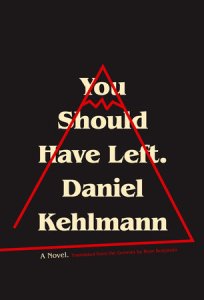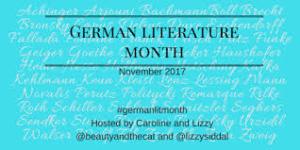I read You Should Have Left by Daniel Kehlmann on Halloween (at just over a hundred short (literally) pages it was easy to finish in a day), ideal timing for what is, at heart, the story of a haunted house. The narrator is a writer – not unusual in the horror genre since Stephen King began to dominate – who has retired to the Alps with his wife, Susanna, and four-year-old daughter, Esther, for a working holiday (that is, they are on holiday, he has a screenplay to write, a sequel to his only successful film).
The house itself is not a typical haunted house:
“Not a musty little Alpine hut, but two storeys, new, and minimalist, with a narrow upper balcony and a large living-room window, clearly an architect-designed house.”
The views are beautiful but Kehlmann also quickly establishes its isolation – it’s a “terrible drive” to get there, along a road “with many hairpin bends and no side barriers.” Both the narrator and Susanna have difficulty coming to terms with the geography of the house:
“On the way to the bedroom we briefly got lost, because we didn’t know the house yet, and we ended up in a storeroom with a washing machine and a dryer.”
Later, having put Esther to bed, he gets lost again – “the corridor suddenly seemed longer to me.” Even a reader well-versed in the genre, however, is unlikely to take much notice as Kehlmann buries the unusual beneath layer upon layer of ordinary: the tensions of their marriage and his preoccupation with the screenplay. When the narrator visits the nearest village (again placing emphasis on the difficulty of the journey), the rural / urban disconnect is comic, items at the local shop being located one by one in a back room before appearing on the counter. This makes it easier to dismiss the store owner’s cryptic comment, “Anything happen yet?” and his even more cryptic gift, a triangle ruler (or set square). A woman who tells him, “Get away quickly,” is harder to forget, particularly when he returns home and, sitting at his desk working, looks at the reflection in the window:
“Only I don’t see myself. In the room in the reflection, there’s no-one.”
His reaction, however, is rational – to take a photo on his phone (of course, when he looks again his reflection is there) and to believe there must be an explanation:
“If I were a physicist, I’d probably know what it is, and all this wouldn’t surprise me.”
Things continue to become stranger in the house, however, for example, when the narrator goes to bath Esther:
“When I reached for the faucet, it was – how can I describe it? It was further back than it should have been.”
Although the effect is slightly spoiled by the word ‘faucet,’ which is perhaps the Americanism I find it most difficult to acclimatise myself to (to be fair to translator Ross Benjamin, he is American), this is exactly the kind of everyday eeriness with which Kehlmann begins to permeate the narrative, slowly building to a point where we feel the characters are in jeopardy without the need for any identifiably supernatural force (though it is supernatural in the strict sense that the house does not seem to follow the laws of nature).
I found You Should Have Left an excellent addition to the ‘haunted house’ genre, a horror story which might also be shelved under science fiction, but largely uses genre as a jumping off point for originality. Within the confines of the narrative, it’s true that even the narrator’s character is not fully developed, but Kehlmann builds tension superbly and never loses the reader to improbability. Though lacking the depth of his novels, it demonstrates his range and adroitness as a writer. A perfect tale for winter.


November 5, 2017 at 7:03 pm |
Hadn’t heard of him, so looked him up. Apparently another of his novels is one of the biggest-selling novels in the German language – so perhaps I should know him. this sounds an interesting take on the haunted house genre – more subtle and surreal. Must look out for him. As I’ve commented on others blogging for German Lit Month, I’m woefully ignorant of this area – must rectify. Some time…
November 6, 2017 at 7:45 pm |
Yes, that novel, Measuring the World, also did quite well here. However, he’s quite a varied writer – his other novels have been more contemporary.
November 8, 2017 at 1:18 pm |
I’m no familiar with him either. Is it actually horror, or is it using genre trappings to explore themes of mortality or whatever? Not that that’s a sharp distinction of course…
November 10, 2017 at 10:21 pm |
It works as a horror story, though not one with a supernatural element. There’s definitely an exploration of our relationship with reality, especially as he is attempting to create his own reality via a screenplay.
November 21, 2017 at 8:10 am |
[…] Firstly the short novella, You Should Have Left, that documents a family vacation in the scariest holiday accommodation ever. Perfect for fans of David Mitchell’s Slade House. It has been very well received on the blogosphere. (cf reviews from Annabel and Grant here and here.) […]
December 5, 2017 at 10:02 am |
[…] 1 Jünger: The Glass Bees 1 Kafka: Investigations of a Dog 1 Kehlmann: You Should Have Left 1 Keller: Stories 1 Keun: After Midnight 1 The Artificial Silk Girl 1 Kleist: An Earthquake in Chile […]
March 1, 2018 at 10:08 am |
[…] Kehlman were short-listed in 2015 and have books eligible again this year (Men Without Women and You Should Have Left). The latter is short but impressive and may have a chance despite lacking press coverage; Murakami […]
November 12, 2020 at 7:33 pm |
[…] I say 100 pages or less, but Daniel Kehlmann’s You Should Have Left (translated by Ross Benjamin) is officially 111 pages, though those pages are all an inch smaller […]